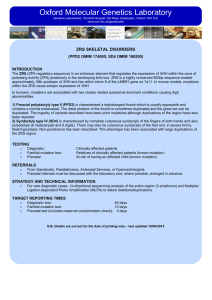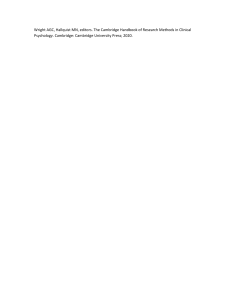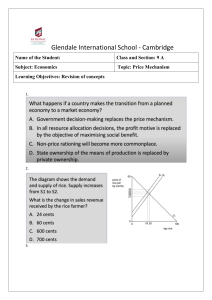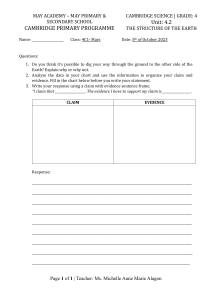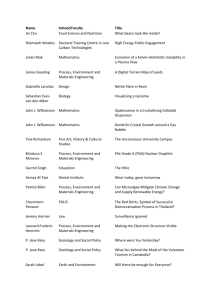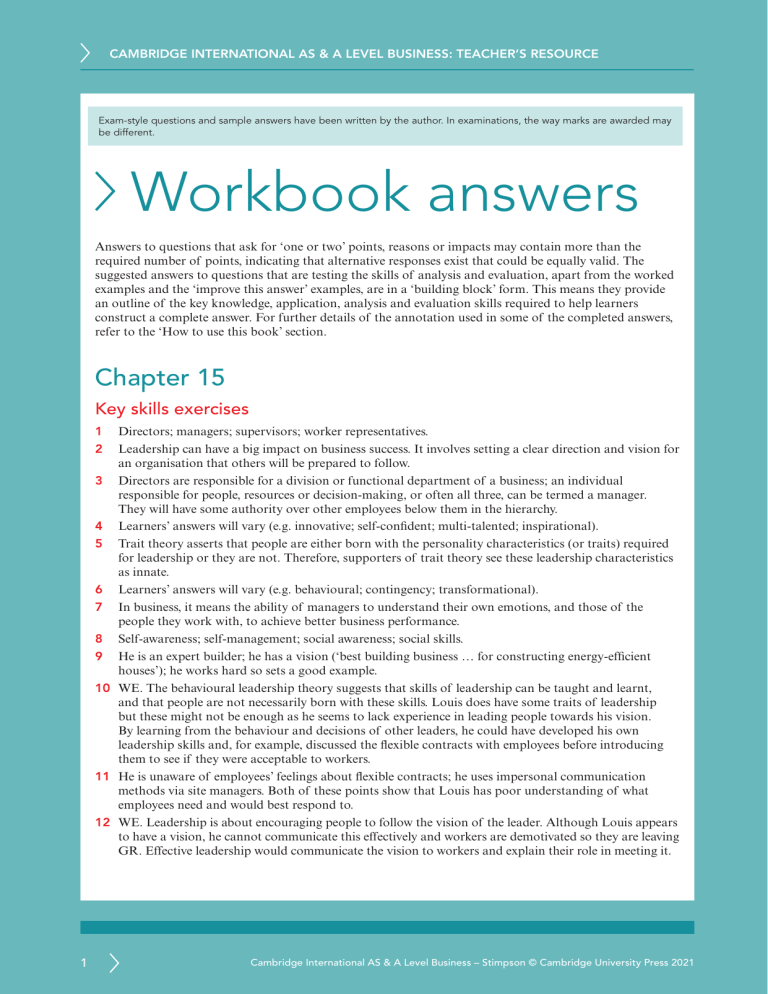
CAMBRIDGE INTERNATIONAL AS & A LEVEL BUSINESS: TEACHER’S RESOURCE Exam-style questions and sample answers have been written by the author. In examinations, the way marks are awarded may be different. Workbook answers Answers to questions that ask for ‘one or two’ points, reasons or impacts may contain more than the required number of points, indicating that alternative responses exist that could be equally valid. The suggested answers to questions that are testing the skills of analysis and evaluation, apart from the worked examples and the ‘improve this answer’ examples, are in a ‘building block’ form. This means they provide an outline of the key knowledge, application, analysis and evaluation skills required to help learners construct a complete answer. For further details of the annotation used in some of the completed answers, refer to the ‘How to use this book’ section. Chapter 15 Key skills exercises 1 2 Directors; managers; supervisors; worker representatives. Leadership can have a big impact on business success. It involves setting a clear direction and vision for an organisation that others will be prepared to follow. 3 Directors are responsible for a division or functional department of a business; an individual responsible for people, resources or decision-making, or often all three, can be termed a manager. They will have some authority over other employees below them in the hierarchy. 4 Learners’ answers will vary (e.g. innovative; self-confident; multi-talented; inspirational). 5 Trait theory asserts that people are either born with the personality characteristics (or traits) required for leadership or they are not. Therefore, supporters of trait theory see these leadership characteristics as innate. 6 Learners’ answers will vary (e.g. behavioural; contingency; transformational). 7 In business, it means the ability of managers to understand their own emotions, and those of the people they work with, to achieve better business performance. 8 Self-awareness; self-management; social awareness; social skills. 9 He is an expert builder; he has a vision (‘best building business … for constructing energy-efficient houses’); he works hard so sets a good example. 10 WE. The behavioural leadership theory suggests that skills of leadership can be taught and learnt, and that people are not necessarily born with these skills. Louis does have some traits of leadership but these might not be enough as he seems to lack experience in leading people towards his vision. By learning from the behaviour and decisions of other leaders, he could have developed his own leadership skills and, for example, discussed the flexible contracts with employees before introducing them to see if they were acceptable to workers. 11 He is unaware of employees’ feelings about flexible contracts; he uses impersonal communication methods via site managers. Both of these points show that Louis has poor understanding of what employees need and would best respond to. 12 WE. Leadership is about encouraging people to follow the vision of the leader. Although Louis appears to have a vision, he cannot communicate this effectively and workers are demotivated so they are leaving GR. Effective leadership would communicate the vision to workers and explain their role in meeting it. 1 Cambridge International AS & A Level Business – Stimpson © Cambridge University Press 2021 CAMBRIDGE INTERNATIONAL AS & A LEVEL BUSINESS: TEACHER’S RESOURCE 13 14 15 16 The introduction of flexible contracts at this time suggests that Louis lacks the emotional intelligence to understand workers’ needs in a competitive industry. Better leadership would mean that productivity within GR would rise, and labour costs would not increase at a time of falling sales and profits. High labour turnover, which adds to high recruitment costs; high unit labour costs (caused by low productivity), which makes the business uncompetitive. Define emotional intelligence first. Explain how Louis would be able to understand workers’ feelings and needs; use social skills to communicate more effectively to explain the vision and workers’ role in achieving it. Outline: Contingency theory of leadership depends on certain variables. Analyse these in the context of GR (e.g. length of service/experience of workers). Analyse how/why a different approach to leadership might help (e.g. in a crisis; when discussing changes to working conditions; when increasing the level of delegation to employees). Evaluation could include assessing the importance of adopting different leadership styles at different times, in the context of this business. This could be weighed against the risk of confusing employees about the leadership style being used at any one time and the danger that if employees become used to/familiar with one style they might find it difficult to adapt to another one. Outline: Define emotional intelligence. Analyse the key features and competencies required for emotional intelligence. Discuss how important these would be to improve Louis’s leadership. Assess other factors that could have improved his leadership. Evaluation might consider whether emotional intelligence is the most important factor that determines effective leadership. Exam-style questions Decision-making questions 1 2 2 Outline: Define transformational leadership and compare it with at least one other theory. Analyse how the key features of transformational leadership would help Zainab lead ZRS even more effectively. Points analysed could include: transformational leaders attempt to change or transform the culture of the organisation to achieve improved performance. The new culture should focus on employee satisfaction, productivity and working for success through motivated employees. Analyse how ZRS would benefit from this approach to leadership. See ‘Annotate this answer’. Cambridge International AS & A Level Business – Stimpson © Cambridge University Press 2021 CAMBRIDGE INTERNATIONAL AS & A LEVEL BUSINESS: TEACHER’S RESOURCE Annotate this answer The sample answer for decision-making Q2 has been annotated. Zainab seems to have many of the qualities or traits necessary to be a good leader for ZRS even as it expands. She has led ZRS to rapid growth already and the business is only five years old [Ap]. This must indicate that she is an effective leader. Zainab works hard and this always gives employees a good example to follow [K/Ap]. If they can see their leader putting in many hours of hard work, they are more likely to be willing to work hard for the business too [An]. Zainab clearly has charisma, at least with business clients. She has won many contracts due to her persuasive and appealing personality, and this helps leaders attract followers too [Ap/An]. People are more likely to take instructions and guidance from someone with an attractive personality than from someone who is always very cross or rude [An]. Also, Zainab has a clear vision for the business: the most recommended agency and a market leader in recruiting senior managers [K/Ap]. This helps to direct her decision-making towards achieving the objectives she has set herself. If she can communicate this vision to employees, and they agree with it, she will have displayed a very important quality of leadership [An/E]. However, there are some doubts about whether Zainab can adapt sufficiently to deal with the leadership issues that arise as ZRS expands. Taking over another business is always risky and this is particularly the case if the cultures are different. FC seems to have been quite people focused with an emphasis on social contact [Ap]. ZRS is much more focused on tasks and meeting targets, with little scope or opportunity for social contact or even meeting business clients. A different culture for ZRS might be necessary if it wants to gain a big market share of the segment that recruits senior managers and directors. Just emailing details of a vacant position of director to potential applicants might be ineffective as senior managers need to be convinced that they might be suited to a vacancy [Ap/An]. Business clients need face-to-face contact with an agency to discuss the precise requirements of a job. At present, Zainab does not seem to be able to adopt transformational leadership, which would allow ZRS to move in the right direction for this new market segment [E/An+]. In addition, Zainab might have great charisma but she also needs to consider the needs of employees. It is not clear whether she has the empathy and emotional intelligence required to manage and lead a larger number of employees. Existing ZRS workers think she does not have enough time for them. FC employees might think that she rejects their old ways of working completely. Unless Zainab can learn to adapt her behaviour to show more empathy towards her employees’ needs, she will fail to lead ZRS successfully in future [E]. If Zainab took some time to consider how other leaders’ behaviour has enabled them to lead large and expanding businesses, then her charisma, hard work and innovative approach might be a good basis for successful leadership of ZRS in future [E+]. 3 Cambridge International AS & A Level Business – Stimpson © Cambridge University Press 2021
